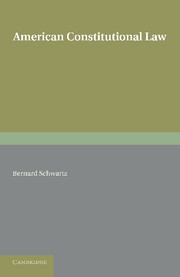Summary
The American who spends some time outside of the United States is struck immediately by the widespread interest displayed in the institutions of his country. Such interest appears, indeed, to be at an all-time high, now that the United States has come to play such a significant role in world affairs. Throughout the world, there is the keenest desire to learn more about the country which, for good or ill, has emerged from its isolationist state to a position of international leadership.
Essential to an understanding of the United States is some knowledge of the American system of constitutional law. For it is no exaggeration to say that the Federal Constitution is the fulcrum upon which American institutions turn. The interpretation of that instrument by the courts has, without a doubt, played a significant part in American history—and this is true not only of legal history in the narrow sense. It may be going too far to say that the history of the United States could be written in terms of leading Supreme Court decisions. But it is certainly true that a study of American history that did not consider them would be a distorted one.
It is the purpose of this book to present the workings of the American system of constitutional law to a British audience, with emphasis upon the significant changes that have occurred therein in recent years. There are, in the author's experience, few fields where comparative analysis can be more fruitful than in that of public law. This is especially true when the law compared is based upon common-law traditions and techniques similar to that upon which the law of Britain is grounded. Nor should the use of the comparative method lead to the feeling that the author's primary purpose is to place the British system in an unfavourable light in comparison with its American counterpart. It is not intended to set up the American law as a yardstick to which the British practice must conform nor to judge the House of Lords and other English courts by appealing to the superior moral jurisdiction of the United States Supreme Court.
The author cannot let this opportunity go by without expressing his gratitude, as an alumnus of the University, at having this volume published by the Cambridge University Press.
- Type
- Chapter
- Information
- American Constitutional Law , pp. xiii - xivPublisher: Cambridge University PressPrint publication year: 2013

